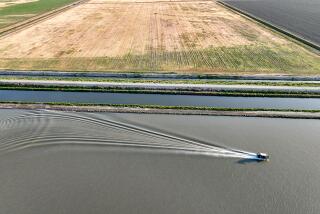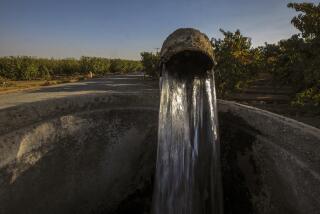Coachella Valley golf courses pumping groundwater must cut use by 25%

Golf courses in the Coachella Valley and elsewhere that rely on private wells will have to reduce water use by 25% or limit watering to twice a week as part of the governor’s mandate for cutbacks. But the courses will not have to report their water usage, meaning compliance is largely on the honor system.
Coachella Valley’s expansive, and often lushly landscaped, desert golf courses have made them obvious targets in California’s push to reduce water use.
But a majority of the valley’s courses — and some in other parts of the state — pump groundwater from private wells instead of taking it from a supplier, so they were initially left out of proposed water restrictions that followed Gov. Jerry Brown’s mandate for reductions.
Unlike homes and businesses that rely on large water suppliers and are closely monitored, rules on what information private well owners are required to submit to authorities vary in different parts of the state.
As officials attempt to formally bring them into the fold during the drought, golf courses and some other private well users will be required to keep their own records on water use and make them available to the state in case of an inquiry. Potential scofflaws could be investigated if someone complains, said Max Gomberg, senior environmental scientist at the State Water Resources Control Board.
The requirements also apply to a small number of other institutional users with independent water supplies, including some amusement parks — though state officials do not know exactly how many businesses rely either partly or fully on private wells, Gomberg said.
“Despite the fact that some of these are golf courses, as a total share of the overall water use in the state, this is really small,” he said. “It doesn’t mean they shouldn’t be held to the same standard. We’re bringing them in for the first time. But we are going to have to exercise discretion and prioritize our enforcement.”
Part of the difficulty, experts said, is that California has not historically had a uniform requirement for detailed data on groundwater pumping.
“Basically the state’s using up its reserve bank account of groundwater, it’s being depleted, and we aren’t even getting monthly statements,” said Tom Stokley, of the nonprofit California Water Impact Network.
Without strict monitoring, he said, any restrictions are “pretty meaningless.”
Legislation passed last year to establish statewide management of groundwater could lead to better data over time. But for now, Gomberg said, “we’re going to have our hands full over the summer and fall just dealing with … urban water suppliers.”
Of 123 golf courses in the Coachella Valley, 70 pump groundwater and the remainder use either recycled water, Colorado River water or both, said Heather Engel, a spokeswoman for the Coachella Valley Water District.
Within the boundaries of that district, which includes many of the valley’s courses, the golf industry pumped about 70,000 acre-feet of groundwater per year in 2012 and 2013, or about a quarter of total groundwater used in those years, according to district records.
Nearly 300 golf courses in the state now use recycled water, Gomberg said.
Despite the lack of tough monitoring, golf course officials are encouraging one another to do everything possible to comply with the rules, said Stu Rowland, director of golf course operations at Rancho La Quinta Country Club and a former president of the Hi-Lo Desert Golf Course Superintendents Assn.
“We already have a big enough bull’s-eye on ourselves, even though we don’t use a large majority of the water in the state. So anything we could do to remove that bull’s-eye would be wonderful,” he said.
Before the latest restrictions were released, several organizations representing Coachella Valley golf courses had urged their members to voluntarily comply with the governor’s order, saying in a statement that “shared sacrifice unites communities.”
Craig Kessler, director for government affairs of the Southern California Golf Assn., said course owners also want the state to develop a better regulatory protocol, one that won’t create confusion.
“Insufficient data exists to do this all that well,” he said. “The fact that California was one of the last states to join other Western states in regulating groundwater was probably the source of this problem. But it’s not a problem that industry created, it’s a problem that the state created.”
The regulations could change before the water board formally adopts them, which is expected this month.
Twitter: @palomaesquivel
More to Read
Start your day right
Sign up for Essential California for news, features and recommendations from the L.A. Times and beyond in your inbox six days a week.
You may occasionally receive promotional content from the Los Angeles Times.







